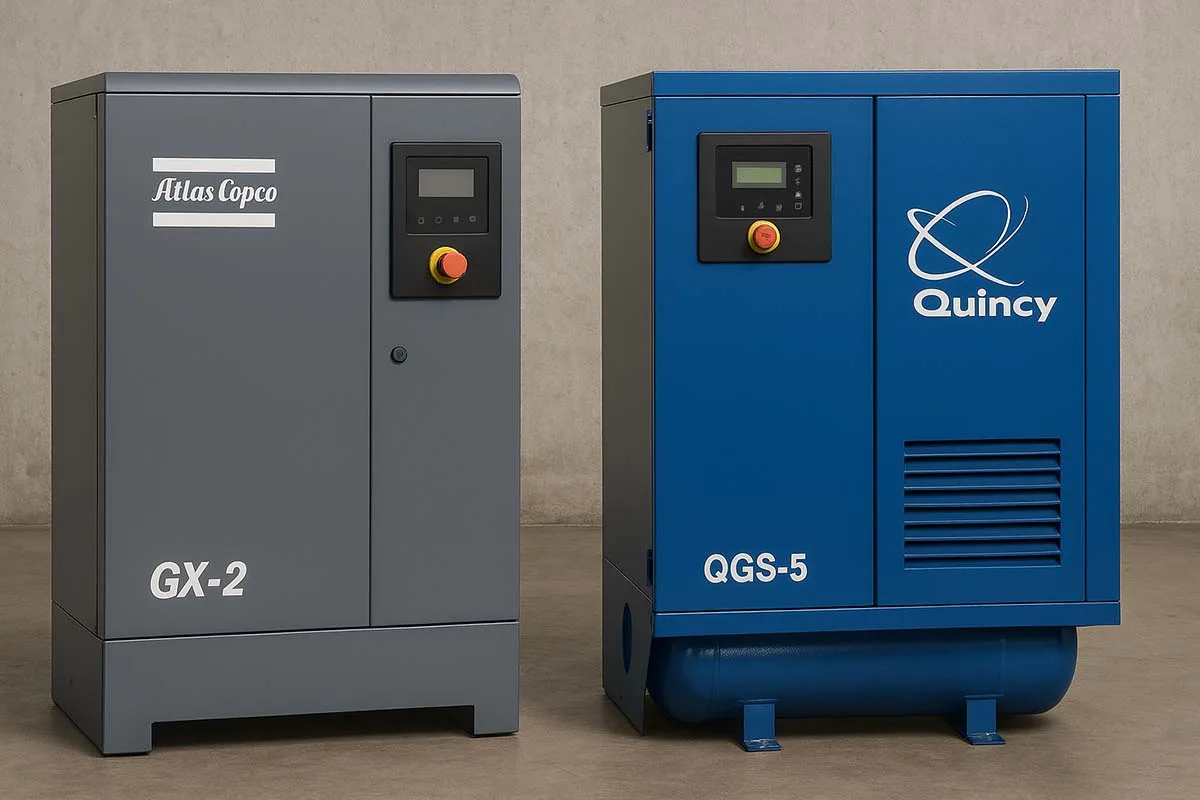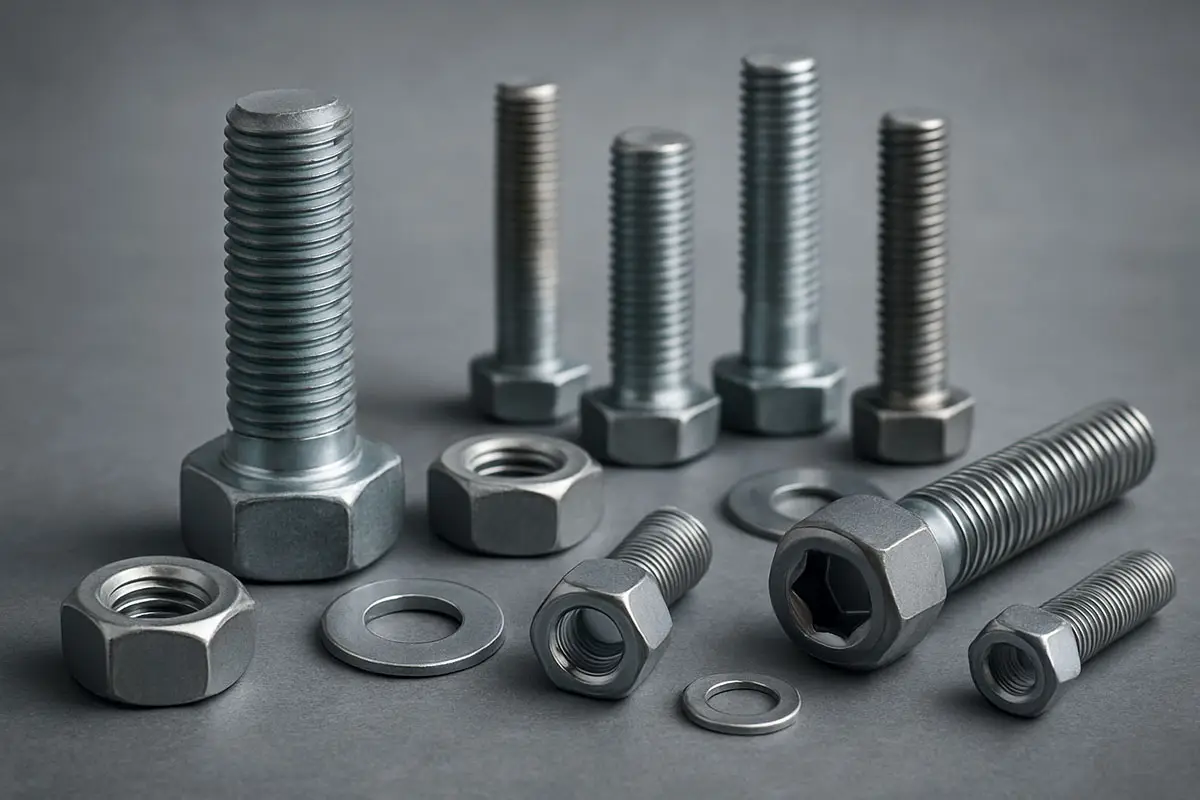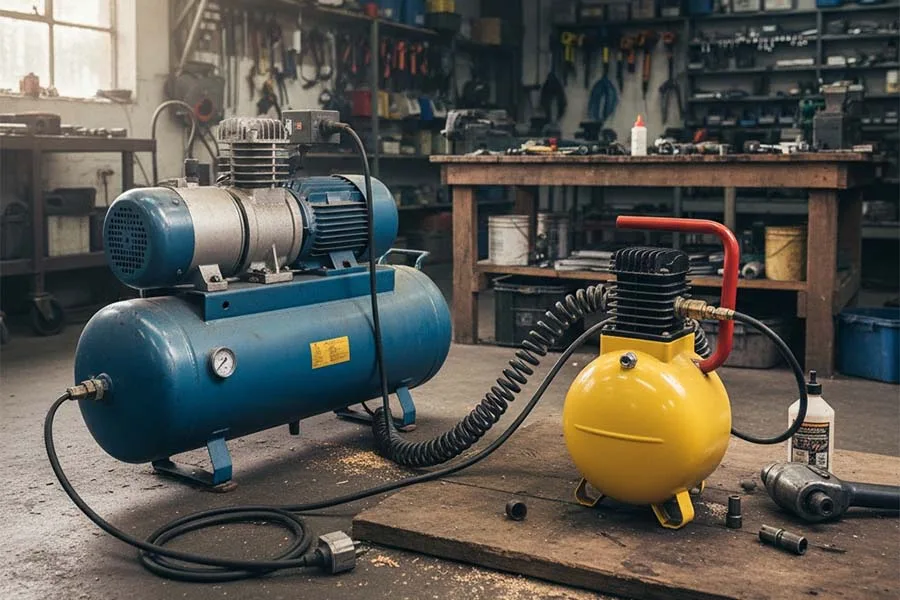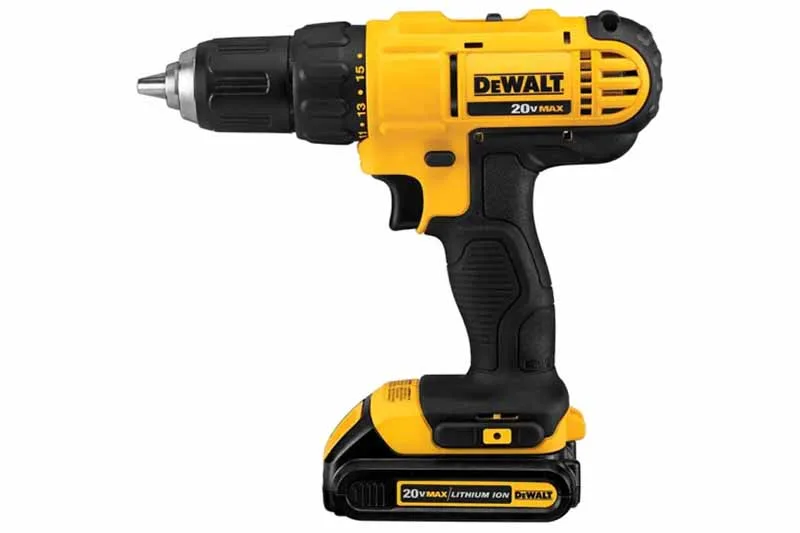Introduction
When choosing a rotary screw compressor for industrial use, two names consistently rise to the top: Atlas Copco GX and Quincy QGS. Both are engineered for quiet, continuous-duty operation and are trusted by manufacturers, CNC shops, and automotive facilities worldwide.
The Atlas Copco GX series is known for its energy efficiency and advanced controls, while the Quincy QGS series offers rugged reliability and simplified maintenance. This comparison breaks down their features, strengths, and ideal use cases to help you make the right investment.
Side-by-Side Feature & Specification Breakdown
| Feature | Atlas Copco GX | Quincy QGS |
|---|---|---|
| Horsepower Range | 3–15 HP | 5–100 HP |
| Duty Cycle | 100% continuous | 100% continuous |
| Noise Level | ~62–66 dBA | ~68–72 dBA |
| Lubrication | Synthetic oil, ~4,000–6,000 hr interval | Synthetic oil, 8,000 hr interval |
| Mounting Options | Tank-mounted with dryer | Base, tank, or tank with dryer |
| Motor Type | IE3 efficiency motor | TEFC motor, IP55 rated |
| Startup Method | Direct start or soft start | DOL (5–15 HP), Wye-Delta (15+ HP) |
| Control Panel | Elektronikon® digital controller | Basic digital panel (20+ HP) |
| Warranty | 1–2 years standard, extended available | 5-Year True Blue Warranty (with authorized startup) |
Strengths & Weaknesses
🔹 Atlas Copco GX
Strengths:
- Advanced control system (Elektronikon®)
- Lower noise levels
- High energy efficiency with IE3 motors
- Compact, integrated design
Weaknesses:
- Higher upfront cost
- Shorter oil change intervals
- Limited horsepower range
🔹 Quincy QGS
Strengths:
- Broad HP range (5–100 HP)
- Longer service intervals (8,000 hours)
- Rugged, technician-friendly design
- Strong warranty with authorized startup
Weaknesses:
- Slightly louder operation
- Basic control interface on lower HP models
- Fewer energy optimization features
Verdicts by Category
| Category | Winner | Why |
|---|---|---|
| Price | Quincy QGS | More affordable across most HP ranges |
| Noise Level | Atlas Copco GX | Quieter operation, better for indoor use |
| Energy Efficiency | Atlas Copco GX | IE3 motors and VSD options |
| Maintenance Interval | Quincy QGS | 8,000-hour synthetic oil standard |
| Ease of Use | Atlas Copco GX | Advanced controls and diagnostics |
| Durability | Quincy QGS | Rugged build, longer service life |
| Best for Small Shops | Atlas Copco GX | Compact, quiet, efficient |
| Best for Large Facilities | Quincy QGS | Scalable HP range, robust design |
Buyer Guidance: Who Should Choose What?
Choose Atlas Copco GX if you:
- Run a small-to-mid-size shop
- Need ultra-quiet operation
- Value energy savings and advanced controls
- Prefer compact, integrated systems
Choose Quincy QGS if you:
- Operate a mid-to-large industrial facility
- Need flexible mounting and HP options
- Want longer service intervals and rugged reliability
- Prefer simplified maintenance and strong warranty coverage
Atlas Copco GX vs Quincy QGS FAQ
Interesting Fact
Atlas Copco’s Elektronikon® controller can adjust motor speed and monitor system health in real time—reducing energy costs and preventing failures.
Lesser-Known Fact
Quincy QGS compressors use IP55-rated TEFC motors, making them ideal for dusty or washdown environments where standard motors may fail.
Read More
- Quincy QGS Series Review: Rotary Screw Compressors
- Quincy QR-25 Review: Heavy-Duty Reciprocating Compressor
- Quincy QGS Series Review: Quiet Rotary Screw Compressors
- Quincy Compressor Maintenance Guide: Keep Your QGS and QR-25 Running at Peak Performance
- Quincy QR-25 vs Ingersoll Rand 2475
- Atlas Copco GX vs Quincy QGS: Rotary Screw Compressors Compared
- Atlas Copco
Conclusion: Which Rotary Screw Compressor Should You Choose?
If you prioritize quiet operation, energy efficiency, and smart controls, the Atlas Copco GX is a premium choice for small-to-mid-size facilities. If you need rugged reliability, longer service intervals, and scalable horsepower, the Quincy QGS delivers industrial-grade performance at a competitive price.
Which one fits your workflow best? Drop a comment below and share your experience. Tag us on LinkedIn or Reddit to join the conversation—and help others choose the right compressor for their needs.





